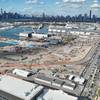AAPA Lobbies For Deeper Harbors
During testimony before the House Transportation and Infrastructure Subcommittee on Water Resources and Environment, port director Erik Stromberg urged Congress to provide adequate funding for deep draft navigation projects. Mr. Stromberg is Executive Director of the North Carolina State Ports Authority in Wilmington, NC. He testified on behalf of the American Association of Port Authorities (AAPA).
In his written testimony, Mr. Stromberg said U.S. ports are gravely concerned that the Administration's Fiscal Year 2003 (FY 03) budget request does not provide enough funding to keep critical navigation projects on schedule or allow for the start of new projects. In addition, he said ports are extremely concerned about the critical backlog that exists for maintenance of the Corps' existing navigation projects.
The Administration's budget requested FY 03 appropriations of $4.175 billion for the Civil Works Program. This represents a 10 percent cut from Fiscal Year 2002 (FY 02) appropriated levels. Specifically, the Construction-General Account, which provides funding for investment in the nation's water resources, was subject to an 18 percent cut in the Administration's budget proposal compared to FY 02 appropriated levels ($1.42 billion v. $1.72 billion). The Administration did not propose to initiate any new construction starts in FY 03 or to continue any new construction starts that Congress approved in FY 02.
More than $534 million is needed - AAPA contends - to fund ongoing and new projects at deep-draft harbors, which provide the gateways for the nation's growing import and export trade. The Administration's budget seeks only $267 million in FY 03.
Under the Administration's Operations and Maintenance account, the FY 03 budget proposal is for $1.94 billion, or slightly less than the appropriated amount for FY 02. In February testimony before the House Appropriations Subcommittee on Energy and Water Development, Corps officials stated that funds provided for FY 02 left a critical maintenance backlog of $702 million, of which $587 million is in the navigation mission. The Corps defined "critical maintenance" as maintenance that should be performed in the budget year in order to continue operation at a justified level of service and to attain project performance goals.
As for the Corps' General Investigation account, which funds reconnaissance and feasibility studies for new water resources projects, the Administration's proposed budget was one-third lower than Congress appropriated in FY 02 ($104 million v. $154 million). Corps officials stated that the cut in study funding is to slow down the rate of studies so the construction backlog won't increase.
According to AAPA testimony, "This blanket policy of suspending all new studies would severely limit the Congress' ability to make informed decisions about Federal investments by stifling critical assessments of the nation's water resource development needs." AAPA urged Congress to reverse this policy.
To remain competitive in the global marketplace, U.S. businesses must have an efficient and reliable transportation system. U.S. ports provide shippers, importers and exporters, with a range of choices to allow them to minimize transportation costs. Goods can be delivered to the consumer more cheaply and competitively. Ports link every community in the nation to the world marketplace. Deep-draft ports handle over 95 percent of the volume and 75 percent of the value of cargo moving in and out of the nation.
Source: AAPA











